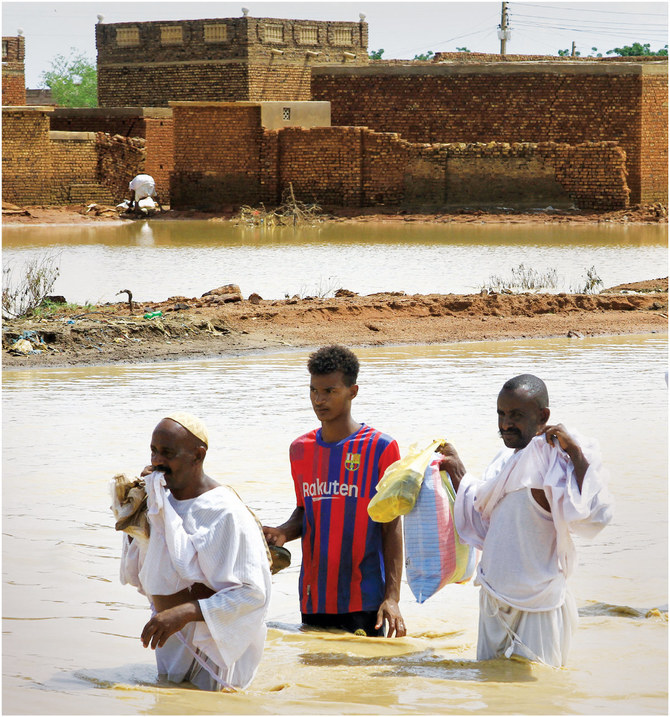
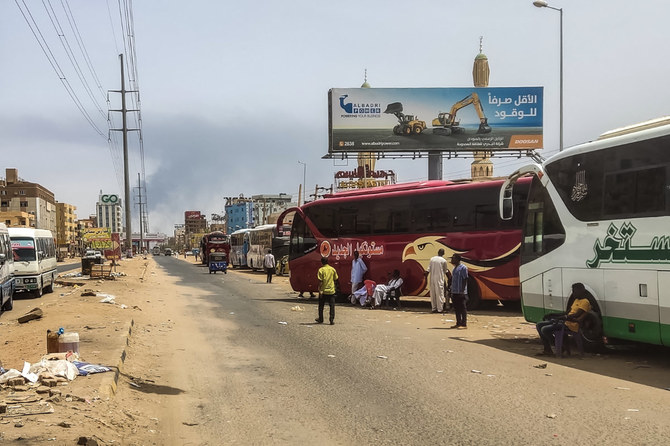
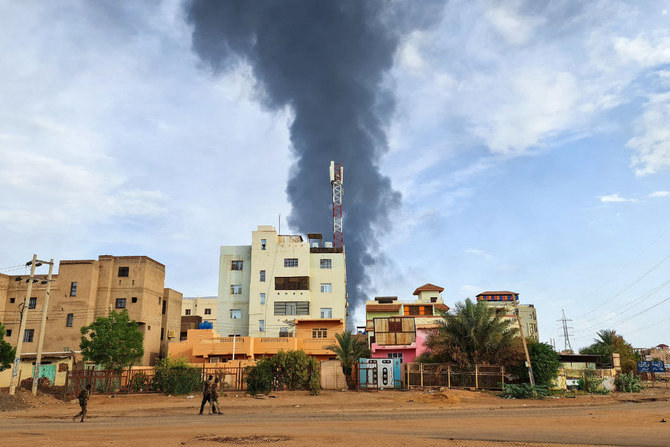



NAIROBI: Civilians displaced by the conflict in Sudan have sought sanctuary in the world’s youngest country next door, the Republic of South Sudan, only to face a daunting new set of challenges.
An estimated 250,000 people — including a large number of South Sudanese who had been living in Sudan — have crossed the border since fighting erupted in Sudan in April, with many now housed in overcrowded camps lacking food, sanitation and basic healthcare services.
High malnutrition rates and outbreaks of diseases such as cholera and measles among the new arrivals testify to the dire health conditions, which aid agencies operating in the area say is one of the many serious causes for concern.
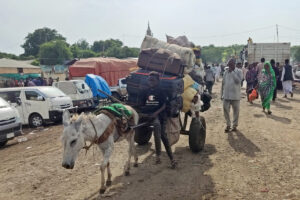
The UN has given warning that the number of people fleeing Sudan could double by the end of the year unless a settlement between the warring parties is reached soon.
Aside from being unprepared to absorb this tide of humanity in search of shelter and sustenance, South Sudan’s own political and economic shortcomings render it an ineffective broker in ending the conflict in Sudan.
This is despite the mediation efforts of South Sudan’s President Salva Kiir, who recently hosted Sudan’s de-facto leader and head of the Sudanese Armed Forces (SAF), Gen. Abdel Fattah Al-Burhan, in the capital Juba.
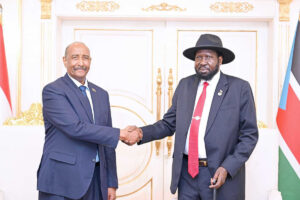
South Sudan is no stranger to hardship and adversity, having had its own bloody conflicts since gaining independence in 2011. Like its northern neighbor, from which it seceded, South Sudan is also grappling with political instability and ethnic conflicts.
Add to the mix South Sudan’s limited resources and primitive infrastructure, and the country is in no position to handle such a large and sudden influx of impoverished people.
“The majority of these refugees are women, children, and young adults, with a notable concentration of youth between the ages of 12 and 22,” John Dabi, South Sudan’s deputy commissioner for refugee affairs, told Arab News.
Particularly, Juba and the border town of Renk have come under pressure from a sudden explosion in population, which has led to an acute shortage of basic necessities, including food, medicine and shelter.
Then there is the impact of a fickle climate, as South Sudan’s rainy season leads to the flooding of entire districts and turns roads into impassable mud tracks, hindering aid deliveries and access to remote refugee camps.
Predictably, South Sudan’s economy is a shambles, despite the recent launch of the National Economic Conference, which is meant to accelerate development.
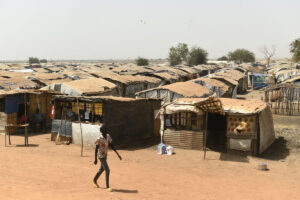
Firas Raad, the World Bank representative in South Sudan, recently urged the government to strive for more stable macroeconomic conditions, robust public financial management, and effective governance reforms to improve conditions for its people.
The parlous state of the country’s economy calls into question Juba’s credibility as a mediator in Sudan’s conflict, Suzanne Jambo, a South Sudanese policy analyst and former government adviser, told Arab News.
“South Sudan still struggles to achieve a stable transition to a permanent status, including a unified army, agreed-upon constitutional arrangements, and fairly elected representatives, not to mention conducting the elections,” she said.
Instability in South Sudan is not just influenced by governance and economics. The ethnic and tribal contours of the Sudanese conflict are all too evident, with millions fleeing to neighboring countries and exposing the political divisions within Sudan and along its porous borders.
For instance, the paramilitary Rapid Support Forces (RSF) group has been recruiting fighters from among Darfur’s Arab tribes.
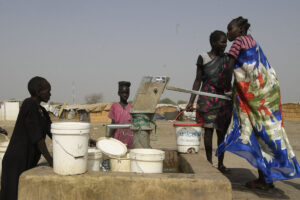
Given the possibility of further escalation of ethnic tensions, experts believe coordinated efforts are essential for the proper distribution of humanitarian aid as well as conflict prevention and resolution strategies.
Sudanese civilians arriving in South Sudan represent a mosaic of backgrounds mirroring the country’s ethnic, racial and religious diversity. To minimize the chances of inter-communal violence, separate settlements, rather than traditional refugee camps, have been established.
“A critical aspect of managing the refugee crisis is preventing inter-community conflicts,” said Dabi, the deputy commissioner for refugee affairs. However, the most pressing issue facing displaced Sudanese in South Sudan is the scarcity of essential resources, he added.
The situation of people who crossed over from Sudan into other neighboring countries appears to be equally dire.
In Chad, where more than 400,000 people have fled the violence in Darfur, aid group Medecins Sans Frontieres says the situation has become so desperate that “people are feeding their children on insects, grass, and leaves.”
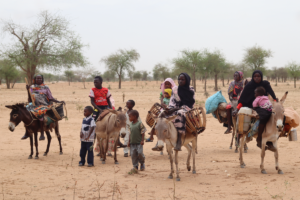
Amid severe shortages, “some have gone five weeks without receiving food,” Susana Borges, MSF’s emergency coordinator in Adre, said in a statement. Camps also lack water, sanitation, shelter, and medical care.
“The most urgent health needs we are dealing with are malaria, diarrhea, and malnutrition,” Borges added. According to the UN, dozens of children under the age of five have already died of malnutrition in Chadian camps.
The conflict in Sudan, now in its fifth month, was triggered by a plan to incorporate the RSF into the SAF.
On April 15 a long-running power struggle between the Al-Burhan and his former deputy, RSF chief Mohamed Hamdan “Hemedti” Dagalo, suddenly escalated, prompting the evacuation of foreign nationals and embassy staff.
At least 7,500 people have been killed since the conflict began, according to a conservative estimate from the Armed Conflict Location & Event Data Project.
Khartoum, Sudan’s capital, and the troubled western Darfur region, where the worst of the violence has been taking place, have seen “intensified shelling” as the SAF and the RSF target each other’s bases with “artillery and rocket fire.”
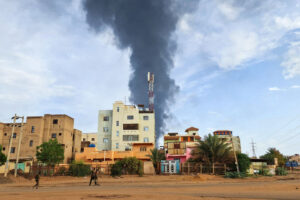
In central Khartoum, the SAF controls the skies and has carried out regular air strikes, while RSF fighters dominate the streets.
In South Darfur’s regional capital, Nyala, residents say fighter jets have been targeting “RSF leadership.” However, reports from the ground suggest civilians are routinely caught in the crossfire.
UN figures show the fighting has uprooted more than five million people from their homes, including one million who have crossed international borders into neighboring countries.
Over the weekend, a cholera outbreak was reported in eastern Sudan and investigations launched to check whether it had spread to Khartoum and South Kordofan state.
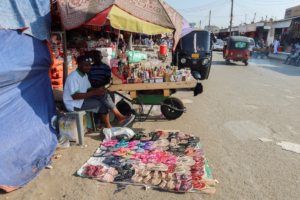
The conflict has also seen a surge in gender-based violence, as confirmed by numerous credible reports of rape, human trafficking, and increase in early marriage.
Despite multiple diplomatic efforts to broker a truce, the conflict has continued and intensified, leaving those displaced with little prospect of returning to their homes any time soon.
As South Sudan struggles to accommodate its own citizens previously living in Sudan, a recent visit to the country by Filippo Grandi, the UN high commissioner for refugees, suggests the international community is taking notice.
However, Peter Van der Auweraert, the UN humanitarian coordinator in South Sudan, has cautioned there could be a significant decline in humanitarian assistance for the country next year.
UNHCR, the UN refugee agency, says humanitarian aid organizations are struggling to meet the needs of the displaced, with only 19 percent of the $1 billion requested from donors so far received.